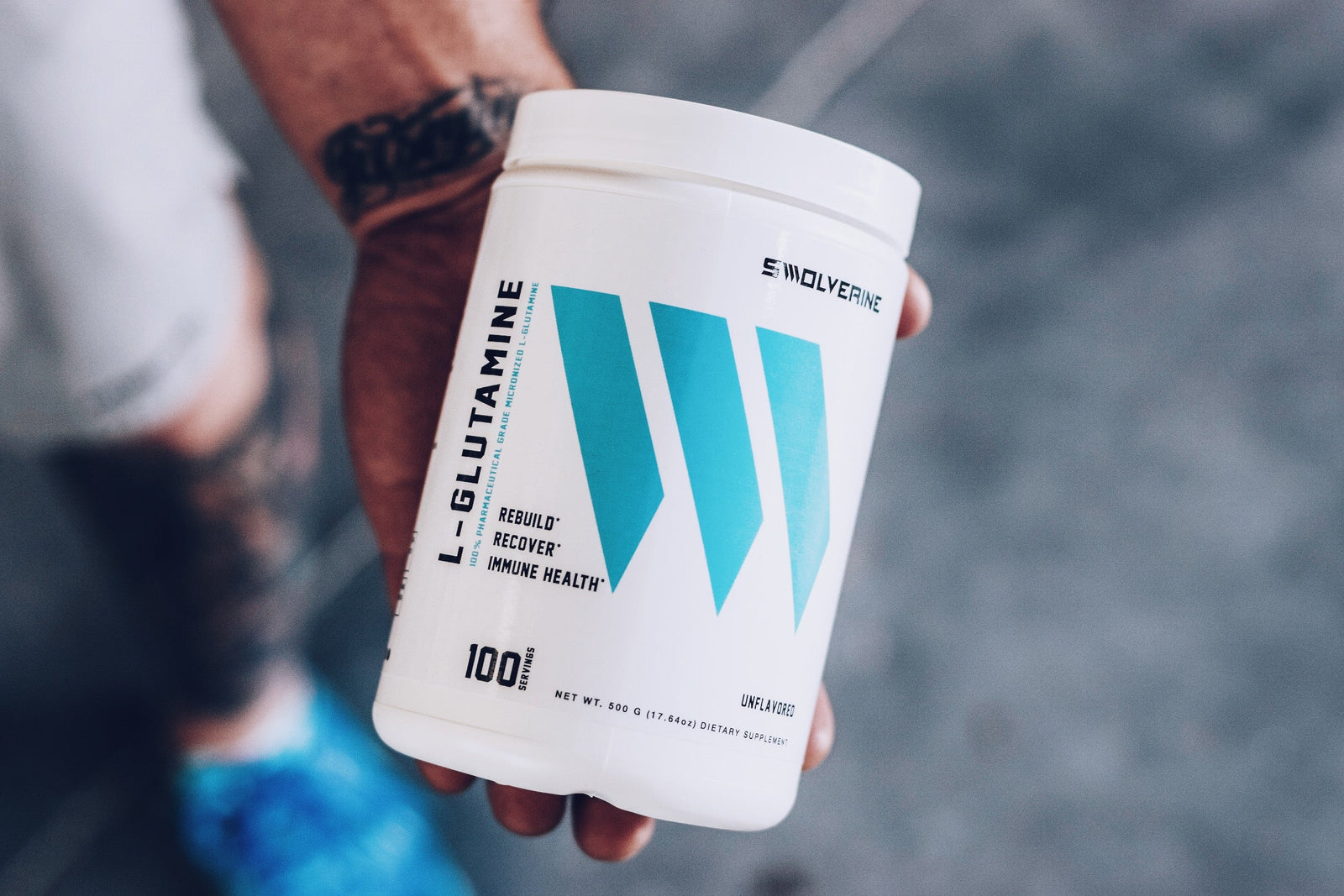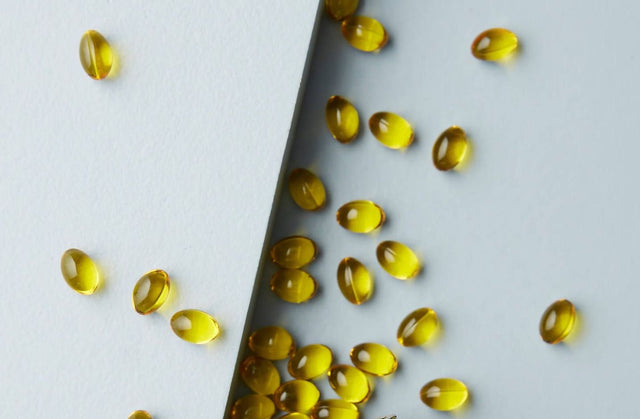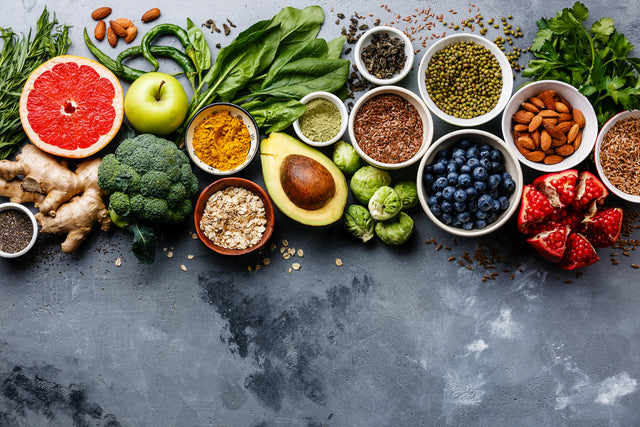Often regarded as one of the most underrated sports supplements, L-Glutamine is gaining increased popularity and finally starting to get the attention it deserves. Glutamine is unique in the fact, that not only does it promote ergogenic benefits, but also supports immune system health and digestive health. A growing body of evidence has also suggested that Glutamine can also help gastrointestinal issues like IBD, IBS, and leaky gut.
In this ultimate guide to L-glutamine, we will cover the following topics
- What Is L-Glutamine?
- How Does L-Glutamine Work?
- What Are The Benefits Of L-Glutamine?
- Does L-Glutamine Help IBS?
- Does L-Glutamine Help Chrons Disease?
- Does L-Glutamine Help Leaky Gut?
- What Is The Best L-Glutamine Supplement?
- How Much L-Glutamine Should I Take?
- When Should I Take L-Glutamine?
What Is L-Glutamine?
The Most Abundant Amino Acid in the Body
L-Glutamine is the most abundant and naturally occurring conditionally essential amino acid in the human body. It comprises approximately 60% of the free amino acids in skeletal muscle tissue, making it a critical component of muscle health and performance (Smith, Journal of the International Society of Sports Nutrition). Nearly 90% of glutamine is produced in the skeletal muscles, and it is one of the few amino acids with such versatility. Unlike many other amino acids, L-glutamine can cross the blood-brain barrier, allowing it to enter the brain freely. Once inside the brain and other tissues, it plays several crucial roles: facilitating nitrogen transport between tissues, aiding in acid-base regulation, supporting gluconeogenesis (the production of glucose), and acting as a precursor for nucleotide synthesis and the antioxidant glutathione (Newsholme, The American Journal of Clinical Nutrition).
How Does L-Glutamine Work?
Muscle Repair, Recovery, and Nitrogen Balance
L-Glutamine plays a vital role in directing the body where and when to place nitrogen atoms in order to rebuild and repair muscle tissue. To build muscle mass and strength, maintaining a positive nitrogen balance is essential (Castell, Nutrition). L-Glutamine is considered a conditionally essential amino acid, meaning that under normal conditions the body can produce enough, but during periods of stress—such as intense training—production may not meet demand.
During rigorous physical activity, your body can rapidly deplete its glutamine stores, which may impair performance, delay recovery, and increase muscle soreness. Supplementing with L-Glutamine ensures your body maintains adequate levels to support muscle protein synthesis, reduce post-workout muscle breakdown (DOMS), and optimize recovery (Cruzat, Nutrients).
By helping preserve lean muscle mass and accelerating recovery, L-Glutamine supplementation is particularly beneficial for athletes, bodybuilders, and anyone undergoing high physical stress or catabolic states.
L-Glutamine Benefits: Immune System Support
Strengthening Immunity Through Amino Acid Support
Glutamine is essential for maintaining a healthy immune system. Often overlooked, endurance athletes and powerlifters alike can experience an increased susceptibility to infection due to weakened immune function during periods of intense training. L-Glutamine is used by white blood cells to produce cytokines—small proteins that regulate immune responses. With an increased number of cytokines during training stress, supplementation with glutamine can help restore balance and protect the immune system from breakdown (Cruzat et al., Nutrients).
In a randomized controlled trial published in the International Journal of Clinical Pharmacology and Therapeutics, 24 athletes were given 10g of glutamine daily for six weeks to investigate its effect on immune function during heavy resistance training. The study showed significant improvements in T-cell function, indicating that glutamine supplementation may help reverse immunosuppressive effects induced by strenuous training (Castell et al., Int J Clin Pharmacol Ther).
While most cells primarily rely on glucose for energy, immune system cells heavily depend on glutamine, especially under catabolic conditions like high-intensity training or illness. This dependency is so critical that glutamine is often referred to as "the fuel source for your immune system" (Newsholme, The American Journal of Clinical Nutrition).
A study conducted by Oxford University's Department of Biochemistry investigated the effects of glutamine on 200 elite endurance athletes, including runners and rowers. Participants consumed a post-workout beverage containing either 5g of glutamine or a placebo. Seven days later, 81% of the glutamine group reported no infections, compared to just 49% in the placebo group (Rowbottom et al., Eur J Appl Physiol).
Related Article: 7 Best Supplements To Boost Your Immune System
L-Glutamine Benefits: Digestive Health
Gut Repair, Inflammation Reduction, and Gut-Brain Support
L-Glutamine has gained widespread recognition for its benefits on digestive health. It plays a critical role in rebuilding and repairing the intestinal lining by regulating nitrogen balance in the body. Glutamine determines where to allocate nitrogen atoms for the most efficient healing. This is particularly beneficial for individuals dealing with gastrointestinal conditions such as leaky gut syndrome, IBS, Crohn’s disease, and ulcerative colitis—all of which are linked to increased intestinal permeability (Wang et al., World Journal of Gastroenterology).
Glutamine Benefits: IBS
A Natural Ally for Managing Irritable Bowel Syndrome
IBS affects approximately 25–45 million Americans, representing 10–15% of the population. Symptoms often include alternating constipation and diarrhea, stomach pain, bloating, and unpredictable bowel habits. Since IBS is a syndrome, not a disease, treatment focuses on symptom management.
A double-blind, randomized control trial published in Gut evaluated 115 patients with IBS. Participants received either 15g of L-glutamine or a placebo for 8 weeks. Those in the glutamine group experienced a ≥50-point reduction in IBS Symptom Severity Scale scores. Other improvements included reduced bowel movement frequency (3 vs. 5 per day), normalized stool consistency, and improved gut permeability (Zhou et al., Gut).
Related Article: Glutamine As A Potential Treatment Option for IBS
Glutamine Benefits: Crohn’s Disease
Supporting Gut Integrity and Immune Function in IBD
Crohn’s disease is a chronic relapsing inflammatory disorder of the GI tract. It presents with symptoms like diarrhea, bleeding, bloating, and severe abdominal pain. Because L-glutamine supports mucosal cell regeneration and gut lining integrity, it may help manage gut permeability and reduce symptoms in Crohn’s patients (Akobeng et al., Cochrane Database).
In a randomized controlled trial at the India Institute of Medical Sciences, 14 patients with increased intestinal permeability were divided into groups receiving either glutamine or whey protein at a dosage of 0.5g/kg of body weight for two months. Those taking glutamine showed a marked improvement in intestinal permeability compared to the control group (Rao et al., Indian Journal of Gastroenterology).
According to the Canadian GI Society of Intestinal Research, “In metabolically stressed individuals, there is an increased demand for L-glutamine, making supplementation essential.” This includes individuals with bowel disease, sepsis, trauma, or even those undergoing strenuous physical activity. Glutamine supports both the small intestine and large bowel, helping to maintain gut villi and prevent bacterial invasion (Canadian Society of Intestinal Research).
Related Article: 14 Studies That Prove L-Glutamine Supports IBD & Digestive Health
Glutamine Benefits: Leaky Gut
Healing and Strengthening the Gut Lining
Leaky gut syndrome is characterized by increased intestinal permeability, allowing toxins and bacteria to pass through the gut lining and into the bloodstream—causing inflammation, bloating, and digestive distress.
L-Glutamine is the primary fuel source for the epithelial cells of the small intestine. It helps rebuild the gut lining and reduce permeability, essentially sealing the gut wall to prevent harmful substances from leaking through.
An overwhelming body of evidence supports L-glutamine’s ability to maintain gut barrier function and restore intestinal integrity. This makes it a highly effective supplement for those experiencing leaky gut syndrome (Kim et al., Nutrients).
L-Glutamine is to your gut what protein powder is to your muscles—it fuels, rebuilds, and protects. The cells lining your gut depend on glutamine to function optimally and maintain strong defenses.
Related Article: L-Glutamine Could Help Heal Your Leaky Gut Syndrome
L-Glutamine Benefits: Increased Muscle Mass
Support for Muscle Growth and Protein Synthesis
L-Glutamine promotes a positive nitrogen balance, a crucial factor in muscle protein synthesis—the biological process where the body converts amino acids into new proteins, resulting in muscle growth. It also helps reduce catabolism, or muscle breakdown, and supports tissue repair, making it an essential tool for increasing lean muscle mass (Cruzat et al., Nutrients).
Although the precise mechanism is still under investigation, evidence suggests a strong connection between glutamine, branched-chain amino acids (BCAAs), and protein metabolism. Glutamine regulates nitrogen balance, while BCAAs are the primary nitrogen donors. Together, they synergistically promote an anabolic environment for muscle development. Glutamine has also been shown to inhibit protein breakdown and reduce BCAA catabolism, reinforcing its critical role in muscle-building (Holecek, Physiological Research).
New Research Highlight:
A 2022 review published in Frontiers in Nutrition explored glutamine's role in muscle hypertrophy and recovery, concluding that glutamine supplementation may enhance lean mass gains during resistance training, particularly in individuals with glutamine depletion due to high-volume training or calorie restriction (Samarasinghe et al., Frontiers in Nutrition).
L-Glutamine Benefits: Faster Recovery
Combat Soreness and Speed Up Recovery Times
Your workout doesn't end when you leave the gym—recovery is a vital phase of performance optimization. L-Glutamine, the most abundant conditionally essential amino acid in the body, is quickly depleted during strenuous training. When levels fall too low, your body becomes catabolic and may start breaking down muscle tissue for fuel.
Muscle soreness is caused by microscopic damage to muscle fibers, often resulting in delayed onset muscle soreness (DOMS). L-Glutamine helps repair this damage, minimizing post-exercise discomfort. Its anti-catabolic properties improve protein metabolism, directly contributing to faster muscle tissue repair and reduced soreness (Street et al., Journal of Exercise Science & Fitness).
A study from Dalhousie University's School of Health and Exercise Performance involved a double-blind, randomized, placebo-controlled crossover trial with 16 healthy participants. It concluded that L-glutamine supplementation significantly improved recovery of peak torque (muscle strength) and reduced soreness after eccentric exercise (Rahmani-Nia et al., JEPonline).
Related Article: Why L-Glutamine Is The Best Supplement For Faster Muscle Recovery And Soreness
L-Glutamine Benefits: Improves Hydration
Enhancing Endurance and Electrolyte Absorption
One often overlooked aspect of recovery and athletic performance is hydration. Dehydration impairs muscle function, delays protein synthesis, and increases the risk of fatigue.
A study published in the Journal of the International Society of Sports Nutrition examined the effects of L-Glutamine supplementation on hydration. Ten male athletes were given 0.3g/kg of L-glutamine or a placebo during endurance training. The group receiving glutamine showed enhanced sodium uptake and improved time to exhaustion. This greater sodium absorption, likely due to increased cellular glutamine uptake, helped maintain muscle contractility and performance (Hoffman et al., JISSN).
By supporting better sodium uptake, L-Glutamine aids in hydration and helps reduce fatigue during prolonged training sessions—making it a valuable addition to any athlete's recovery routine.
What Is the Best L-Glutamine Supplement?
How to Choose a Quality Glutamine Supplement for Performance and Gut Health
When you’re searching for the best L-Glutamine supplement, there are several important criteria to ensure effectiveness, purity, and value. Glutamine is most effective in powder form, not capsules. The recommended dose for many clinical and performance applications ranges from 10 to 30 grams per day, which would require taking 15 to 30 capsules daily if not in powder form. This makes capsules both inefficient and expensive. Powdered glutamine is easier for your body to digest and absorb, especially when taken on an empty stomach (Cruzat et al., Nutrients).
Unflavored and Odorless
Choose a product that is unflavored and odorless for optimal mixability. Artificial flavors and additives may irritate the gut lining, particularly in individuals dealing with digestive issues such as IBS, leaky gut, or IBD.
No Fillers or Additives
Select a supplement that contains 100% pure micronized L-Glutamine with no unnecessary fillers or additional amino acids. Always check the ingredient label under “other ingredients.” Many commercial products include blends that dilute potency and add compounds your body may not need.
Higher Dose per Serving
Many glutamine products provide only 2 to 3.5 grams per serving. Look for a supplement that provides at least 5 grams per serving, allowing for more effective dosing and better value per scoop.
Transparent and Trustworthy Sourcing
Choose a product with clear ingredient sourcing, third-party testing, and full label transparency. This is especially critical when taking glutamine for gut-related issues, where additives may interfere with healing or digestion.
If you're looking for an L-Glutamine supplement that meets all of these standards, Swolverine’s L-Glutamine is an excellent option. It contains 100 pharmaceutical-grade servings of unflavored, micronized L-Glutamine at 5 grams per serving, making it ideal for supporting muscle recovery, gut repair, and immune health.
How Much L-Glutamine Should I Take?
Recommended Dosing Guidelines Based on Use
Research shows that glutamine dosage can vary based on intended use. The most effective results occur when L-Glutamine is taken on an empty stomach to ensure full absorption and transport to tissues in need (Wischmeyer, Critical Care Medicine).
For Athletic Performance and Recovery
A daily dose of 5 to 10 grams per day is effective in supporting post-workout recovery, improving muscle repair, and reducing delayed onset muscle soreness (DOMS). Athletes training at high volume or intensity may benefit from dosing pre- and post-workout.
For IBS (Irritable Bowel Syndrome)
Studies recommend 15 to 20 grams per day for individuals managing symptoms of IBS. This dose supports gut lining repair and helps normalize intestinal permeability (Zhou et al., Gut).
For Leaky Gut
Individuals with leaky gut syndrome typically benefit from 20 to 30 grams per day to help restore gut barrier function and reduce inflammation.
For Crohn’s Disease, Ulcerative Colitis, or Other IBD
For inflammatory bowel diseases (IBD), dosing depends on individual needs and disease severity. However, most clinical trials recommend approximately 30 grams per day, divided into multiple doses for optimal absorption and sustained support (Rao et al., Indian Journal of Gastroenterology).
When Should I Take L-Glutamine?
Timing Strategies for Maximum Benefit
For Athletes and Active Individuals
To optimize muscle recovery and minimize soreness, take 5 grams of L-Glutamine either before or after training. If engaging in high-volume or heavy lifting sessions, consider an additional 5-gram serving later in the day.
For Gut Health and Digestive Conditions
For individuals supplementing to support gut health, glutamine should be taken on an empty stomach, ideally:
-
10 to 15 grams in the morning, and
-
10 to 15 grams at night before bed
This protocol allows for consistent delivery of glutamine to the intestinal lining during periods of fasting, when absorption is optimized and healing is most active.
The Ultimate Guide to L-Glutamine: Final Takeaway
L-Glutamine might be one of the most underrated supplements on the market—but not for long. Once considered useful primarily for athletic performance and muscle recovery, this conditionally essential amino acid is now being recognized for its broad range of benefits far beyond the gym.
From enhancing recovery, reducing exercise-induced muscle breakdown, and promoting lean muscle growth, to supporting gut integrity, immune function, and managing chronic digestive disorders like IBS and IBD—L-Glutamine is proving to be one of the most versatile and impactful amino acids in human health.
Whether you're an athlete, someone navigating digestive health challenges, or simply looking to support your body’s recovery and resilience, L-Glutamine is a research-backed, multifaceted supplement worth adding to your daily regimen.







